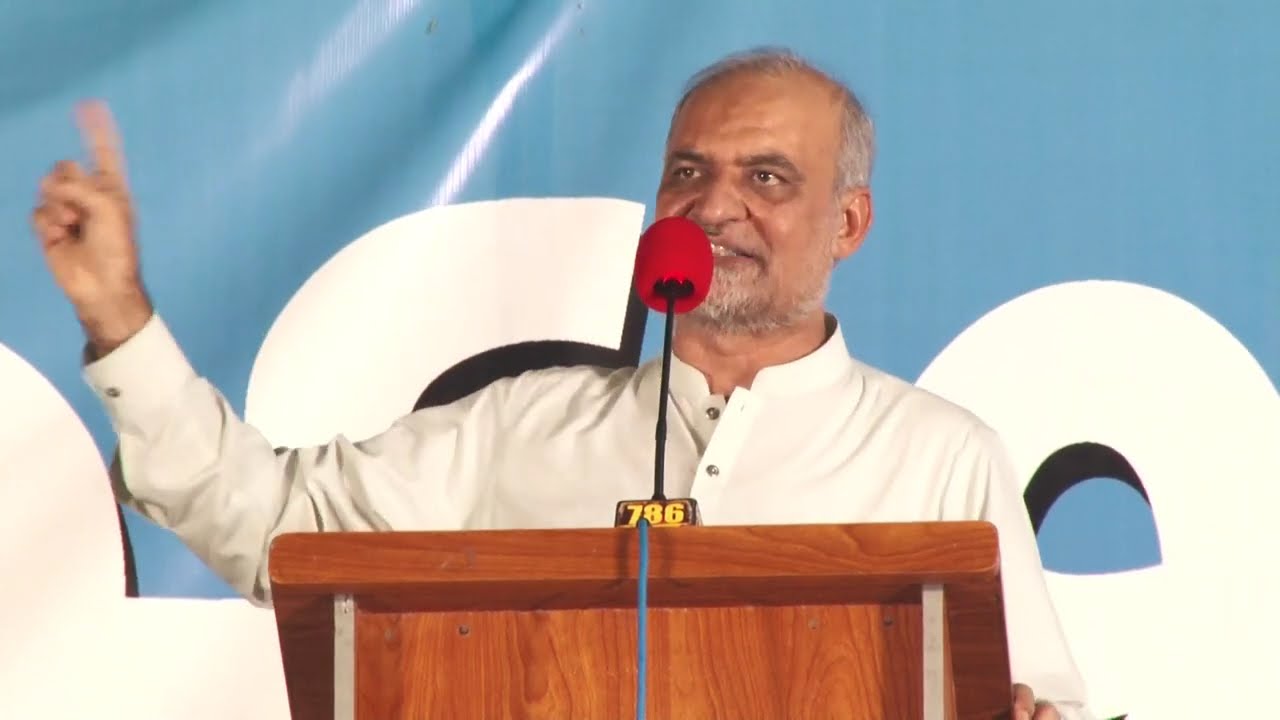Hafiz Naeem ur Rehman, the Ameer of Jamaat-e-Islami, has demanded land reforms and actions against feudal lords in the country, and has also warned about public discontent and anger.
In his speech in Rawalpindi, the Jamaat-e-Islami chief stated that the country is already in a state of rebellion and anger, and the gap between the government, the public, and institutions is widening. He said that as this gap grows, so does the turmoil. He emphasized that they do not want to push people further into turmoil, but if the government believes this is a sign of weakness, that is not the case.
Hafiz Naeem ur Rehman noted that today marks the 14th day of the sit-in, and their demands are clear: curb the IPPs (Independent Power Producers), reduce the tariff for salaried individuals, and impose taxes on large feudal lords. He questioned why this class has exemptions in Pakistan, pointing out that a poor person pays tax on their mobile phone cards while feudal lords do not. He highlighted that salaried individuals pay 368 billion rupees in taxes, while feudal lords contribute only 5 billion rupees across Pakistan.
During the sit-in against inflation in Rawalpindi, Hafiz Naeem further clarified that they are not talking about small farmers. Small farmers should receive relief, but large feudal lords should be brought into the tax net and tax collection from them should be ensured. He remarked that these feudal lords were given land by the British, not earned through their own effort, and their descendants are now enjoying the benefits. He emphasized that feudal lords control politics, society, wealth, economy, agriculture, crops, and mills. This is a class that did not earn its wealth through hard work, and their lands should be redistributed to farmers. Hafiz Naeem ur Rehman also demanded land reforms.
The Jamaat-e-Islami chief claimed credit for addressing the issues of deprived and helpless farmers and exposing the system that benefits certain people while exploiting others.
Hafiz Naeem said that these individuals have given the FBR (Federal Board of Revenue) a free hand to undermine exports, claiming that FBR has been granted judicial powers. Exporters have expressed willingness to accept taxes with increases but prefer not to involve the FBR in the process. Hafiz Naeem demanded that exporters be taxed as they have been previously. He revealed that investigations into the FBR have uncovered 1.299 trillion rupees in corruption, where tax money was embezzled in exchange for bribes.
He added that those not paying taxes are being let off with bribes, while ordinary people are struggling to collect even one billion rupees in charity. He claimed that approximately 4 to 5 billion dollars worth of corruption is occurring within the FBR.
Shahbaz Sharif: We Cannot Immediately Free the Poor from Inflation and High Electricity Costs
Prime Minister Shahbaz Sharif stated that while the poor are suffering due to inflation, they cannot be immediately freed from the burdens of inflation and high electricity costs.
He made these remarks during a speech at a conference of scholars and clerics held in Islamabad, where Chief of Army Staff General Asim Munir was also present. The Prime Minister noted the storm of lies and insults on social media and the ongoing division in the country.
He praised the army chief’s passionate, faith-inspiring speech, saying it reflects the path indicated by the Creator and Sustainer of the world. Shahbaz Sharif emphasized that the country’s independence, achieved under Quaid-e-Azam’s leadership, involved numerous sacrifices from millions of people, and the need for unity today is greater than ever before.
He noted that divisive elements have played a destructive role in history, and it is important to learn from Islamic history and recognize those who claim to be Pakistani while fostering enmity under that guise. He stressed that the current situation is one of division and infighting.
The Prime Minister criticized the current state of public service politics post-2018, accusing social media of spreading lies, distorting facts, and insulting the sacrifices of martyrs. He described the May 9th incident as an unprecedentedly heartbreaking event in history.
Shahbaz Sharif compared the current state to the 1971 tragedy, mentioning that despite past issues, today’s situation involves similar divisive politics. He called upon scholars and clerics to play a leading role in addressing these challenges.
He stated that while debt has been a persistent issue for 77 years, breaking free from this cycle is not easy. However, he expressed hope that with decisive action, no obstacle will be too great. The Prime Minister highlighted ongoing efforts to alleviate economic difficulties and improve the situation for the poor.
Shahbaz Sharif acknowledged that while the government has allocated 50 billion rupees to provide relief to consumers using up to 200 units of electricity per month, the burden on those consuming between 200 and 500 units remains significant. He emphasized ongoing consultations with allied government members and the military leadership to develop a comprehensive plan.
He concluded by reaffirming the government’s commitment to addressing economic challenges and achieving stability through sustained efforts and consultations.

